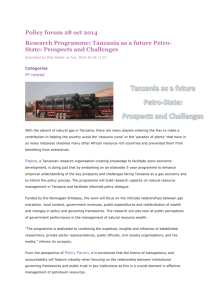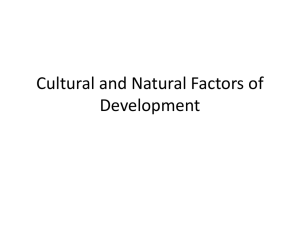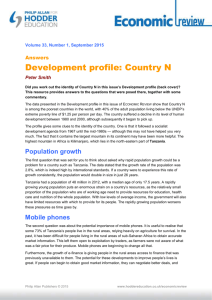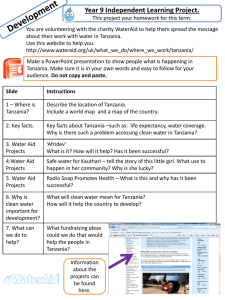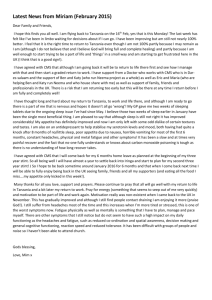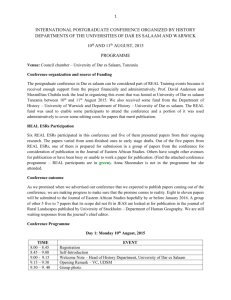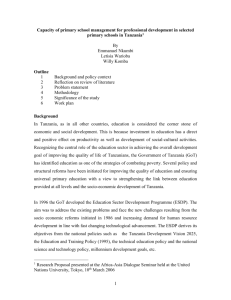constitutional making process in tanzania
advertisement
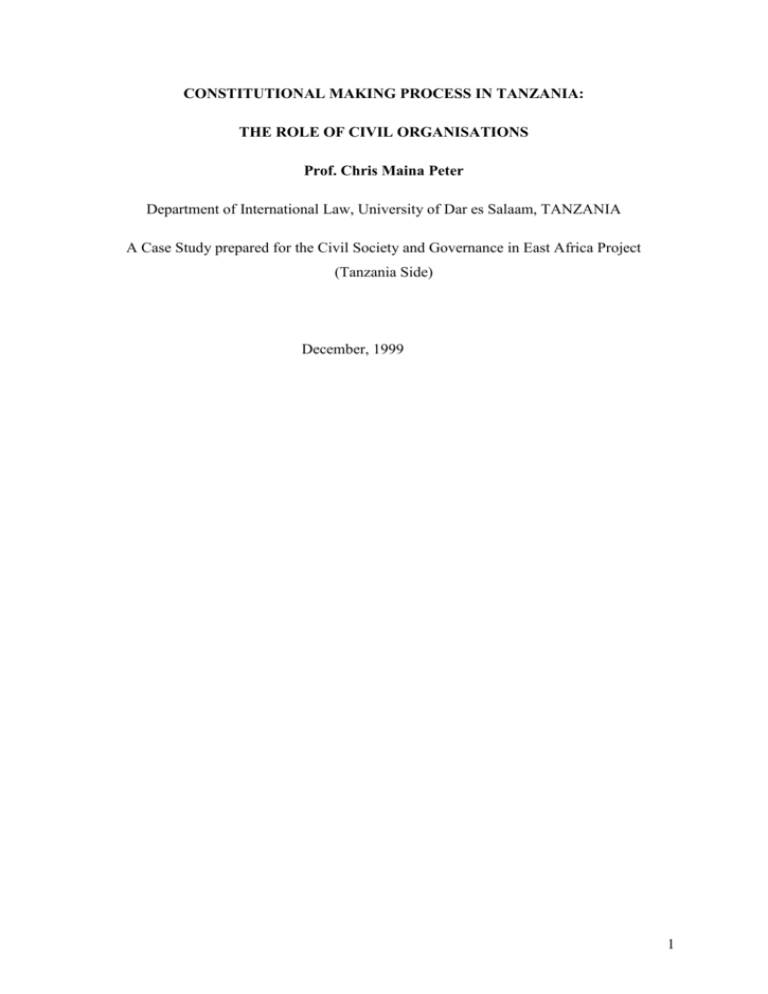
CONSTITUTIONAL MAKING PROCESS IN TANZANIA: THE ROLE OF CIVIL ORGANISATIONS Prof. Chris Maina Peter Department of International Law, University of Dar es Salaam, TANZANIA A Case Study prepared for the Civil Society and Governance in East Africa Project (Tanzania Side) December, 1999 1 Table of Contents: I. Introduction II. The Constitution and Constitution Making III. Struggle for Independence: The Role Played By Civil Organisations IV. Independence and Marginalisation of Civil Society V. Civil Society and the 1983 Constitutional Debate VI. Civil Society in the Struggle for Multi-Party Politics VII. The White Paper: The Role of Civil Society VIII. Conclusions and Observations IX. Selected Bibliography 2 No one person has the right to say, "I am the People." No Tanzanian has the right to say, "I know what is good for Tanzania and others must do it." All Tanzanians have to make the decisions for Tanzania." Julius Kambarage Nyererel1 I. Introduction This case study examines the role played by civil society organisations in the constitutionmaking process in Tanzania. The study begins by examining the struggle for independence and the movement towards the very first constitution of the country in 1961. In this process people in various organisations contributed immensely to the process of paving the way to independence. The most prominent organisations include the co-operatives in which the peasantry organised themselves and the various trade unions which represented the working people in various trades and professions. Later on, we look at the process of constitution-making after independence. The focal point will be again the contribution of civil society in this process. This area covers struggles of over thirty years. We conclude by a prognosis on what the future holds concerning the role of civil society in constitution making in the country. II. The Constitution and Constitutional Making The constitution of a country is the most important legal document. It is the supreme law and at times it has been referred to as 'the social contract'. It is the contract between the rulers and the rulers. It is therefore more than just a document. It embodies the wishes and aspirations of the country. All the laws, by-laws, rules and regulations find their legitimacy from the constitution. Constitutions take various forms. There are written and unwritten constitutions. Great Britain, for instance, has no written constitution. It is guided by traditions developed over the years. However, most countries and particularly those in the developing world have written constitutions. Most of these have been developed and shaped by their colonial past. Some were negotiated with the departing colonial powers. They were or are compromises 3 between the interests of the departing rulers and the ruled who were now taking over power. Some of these developed countries have gone beyond the so-called independent constitution to a more home-grown constitution. They have nevertheless retained the tradition of the former rulers. For instance, constitutions of most of the former British colonies will retain the Westminster tradition with clear separation of powers, independence of the judiciary and, generally, existence of checks and balances. Tanzania was formally under the British as a mandate under the League of Nations and later as a Trustee Territory under the United Nations.2 Its independence constitution was negotiated with the former rulers. One major concession made by the British was to allow the then Tanganyika to become independent with a constitution that did not contain a Bill of Rights.3 In this Case Study we examine the development of constitution making in Tanzania after independence and the role played in this process by the civil society and particularly the non-governmental organisations (NGOs). III. Struggle for Independence: The Role Played By Civil Organisations During the struggle for independence and particularly in 1940s and 1950s, there was a very close relationship between the nationalist leaders and the various civil organisations allowed by the colonial regime to exist. It was almost impossible to separate these groups.4 The peasants in their co-operative movements and the working people in their various trade unions provided the nationalist leaders with a forum in which they could address the public "legally" without having to go through the rigours of getting the required permits for meetings from the authorities. It is on record that even social organisations such as football clubs like Young Africans Sports Club and Taarab Clubs such as Egyptian Musical Club in Dar es Salaam were civil groups which assisted the nationalist movement in its struggle for the independence of the country. Therefore, the role of civil organisations during the colonial period cannot be underestimated. They were very crucial, and in particular brought 1 See NYERERE, Julius K., Freedom and Development, Dar es Salaam: Oxford University Press, 1973, p. 70. See CHIDZERO, Bernard T.G., Tanganyika and International Trusteeship, London: Oxford University Press, 1961. 3 See READ, James s., "Bills of Rights in the Third World: Some Commonwealth Experiences," Volume 6 Yerfassung and Recht in LJbersee, 1973, p. 21; and MARTIN, Robert, Personal Freedom and the Law in Tanzania: A Study of Socialist State Administration, Nairobi: Oxford University Press, 1974, p. 38. 4 See FRIEDLAND, William H., VUTA KAMBA: The Development of the Trade Unions in Tanganyika, Stanford, California: Stanford University and Hoover Institution Press, 1969. 2 4 together large numbers of people. Worth noting are the co-operative movement and the trade unions. This very amicable and supportive relationship was to change considerably after independence. IV. Independence and Marginalisation of Civil Society At independence the very close relationship between politicians and civil society members in various organisations came gradually to an end. This was due to the differences in perception of what the political independence meant for the people of Tanzania. As for the co-operative movement, things were much easier. The top brass in the major co-operative societies were co-opted into the new government. The most notable ones were those from the Lake Zone: Paul Bomani from the Victoria Federation in Mwanza, a strong cotton growing zone, and George Kahama from Bukoba, where there was a strong coffee-growing area; and others. This co option did not mean freedom for co-operative movement. It is still placed under the tight control of the government with the Minister responsible for Agriculture keeping an open eye on their operations.5 The problem was the trade unions. There was a sharp division and divergence of views among the leadership. Some wanted to join the new government and involve themselves in politics proper. Others wanted to maintain their positions in the trade unions and continue with the struggle for the improvement of the welfare of working people. Yet others joined the government for a short while and later left. There were serious repercussions to follow for the trade union movement in the country.6 Therefore, people like Michael Kamaliza joined the new Government and were given cabinet posts and other trade union leaders like Christopher Kasanga Tumbo joined the government for a short time and then left.7 For those who insisted on continuing the trade union tradition of fighting for the rights of workers and their welfare, the government was losing patience.8 The Tanganyika Federation of Labour (TFL) was outlawed and the leadership banished to remote areas of the country. One of the top leaders of the movement, Victor Mkello was deported to Sumbawanga. TFL was replaced by the state-sponsored and supported National 5 See NAALI, Shamshad, "State Control over Co-operative Societies and Agricultural Marketing Boards," in SHIVJI, Issa G. (ed.), The State and the Working People in Tanzania, London: CODESRIA, 1985, p. 132. 6 See KAPINGA, Wilbert B.L., "State Control of the Working Class Through Labour Legislation," in SHIVJI, Issa G. (ed.), The State and the Working People in Tanzania, London: CODESRIA, 1985, p. 87. 7 Kasanga Tumbo was appointed Tanzanian High Commission to the Court of St. James (Britain) and resigned after a short time. 8 See PRATT, Cranford, The Critical Phase in Tanzania 1945-1968: Nyerere and the Emergence of a Socialist 5 Union of Tanzania Workers (NUTA) which was affiliated to the Party. For many years to follow, the Secretary General of this "trade union" was always a cabinet minister responsible for labour. That development marked the end of the struggle between civil society and the government over the destiny of the country. Therefore, for most of the post-independence period a large portion of civil society was submerged within the ruling party. This was in the form of what were referred to as 'mass organisations' of the ruling party. These were those concerned with youth, parents, workers, women and peasants (co-operatives).9 As a result of this co-option by the State, these civil groups could not contribute meaningfully to the advancement of the struggle towards a progressive and democratic country. This applies to the contribution towards improving the constitution as the main law of the country governing the relations between people and their government, and amongst themselves. V. Civil Society and the 1983 Constitutional Debate The members of the public in their various organisations have never given up the attempt to contribute to the welfare of their society. This is notwithstanding the pressure and the squeeze from the State. Whenever an opportunity is offered, the members of the public and their organisations have tended to grab the opportunity and utilise it to the full. One such opportunity came with the desire by the ruling party to effect changes to the constitution of the United Republic of Tanzania in 1983. There was a serious debate on the constitution and the civic groups contributed effectively to this debate. The ruling party being supreme under the constitution declared the areas it desired to be changed. These areas were: 1. The powers of the President; 2. Consolidation of the authority of the Parliament; 3. Strengthening the representative character of the National Assembly; 4. Consolidation of the Union; and Strategy, Nairobi: Oxford University Press, 1978, p. 123. 9 See SAID, Mohamed, "Has the Present Tanzania Labour Movement Abdicated a Political Role?" Volume 2 Nos. 8 and 9 Change, August September, 1994, p. 50 6 5. Consolidation of the peoples' power.10 The debate began slowly with the people, due to the long suppression under one-party rule, wanting to remain within the dictates of the party; that is, to restrict their views only to the areas indicated by the party as wanting to be looked into. However, as the debate picked up in tempo, members of the public began making comments on the whole constitution and indicating the various weaknesses in this supreme document.11 Leading this crusade was the NGOs of advocates and lawyers, the Tanganyika Law Society (TLS). This society has a long and chequered history. Over the years it has evolved from a conservative lawyers' club to a force to be reckoned with in constitutional issues. According to Tambila: Most NGOs, as part of Tanzanian civil society, kept a very low profile during the years of demobilisation of civil society with the notable exceptions of the Tanganyika Law Society, the University of Dar es Salaam Academic Staff Assembly (UDASA) and CHAKIWATA. 12 From 1983 the Tanganyika Law Society became very vocal on issues concerning the constitution and actually led the debate on democracy in the late 1980s and early 1990s.13 Therefore, whenever the issue of the rights of the citizens has been placed on the agenda, the society has been very clear in expressing the views of the majority of its members. For instance, when the President of the United Republic of Tanzania appointed the Commission on the One-party State, and this commission was going around the country collecting people's views, TLS sent a well-considered memorandum to the Commission in which it indicated that it was necessary to have a Bill of Rights in the constitution of the country if that constitution is to get respectability from the members of the international community. 14 10 See CHAMA CHA MAPINDUZI, 1983 NEC Proposals for Changes in the Constitution of the United Republic and the Constitution of the Revolutionary Government of Zanzibar, Dodoma: C.C.M. Department of Propaganda and Mass Mobilisation, 1983. 11 PETER, Chris Maina, Human Rights in Tanzania: Selected Cases and Materials, Cologne: Rudiger Koppe Verlag, 1997. 12 This is the Chama cha Kitaaluma cha Waalimu Tanzania - an independent professional teachers' organisation. 13 See TAMBILA, Kapepwa L, "The Transition to Multi-Party Democracy in Tanzania: From One State Party to Many State Parties," op. cit. at p. 41. 14 The views of Tanganyika Law Society were recorded in the Commission's report. See GOVERNMENT OF THE UNITED REPUBLIC OF TANZANIA, Report of the Presidential Commission on the Establishment of a Democratic One Party State, Dar es Salaam: Government Printer, Dar es Salaam, 1968. 7 The recommendation was ignored by the commission but the point had been made. The 1983 debate was another opportunity for the Law Society to make its mark on the constitutional map of the country. As the debate was going on, the society organised a three-day seminar on the constitution. Among the contributors to this seminar was Wolfgang Dourado, the former Attorney-General of Zanzibar, who wrote a paper on the union between Tanganyika and Zanzibar and advocating for a three-government system instead of the current two. During the seminar, participants openly argued for introduction of multi-party democracy in the country and doing away with the one-party system and party supremacy. It was also insisted that time has come for the Bill of Rights to be entrenched into the constitution of the country. The government of the day was not happy with the issues raised in the seminar. While closing it, the then Attorney-General and Minister for Justice, Hon. Joseph Warioba, indicated clearly that it was important for the lawyers to adhere to the guidance given by the party on the areas which desired changes in the constitution if they were to be relevant to the country. This seminar had two opposite results: one positive and the other negative. On the negative side, two of the ideas raised and developed in the course of the seminar were summarily rejected. These were on the introduction of multi-party political system in the country, and on the re-organisation of the two-government union to a three-government federation. To add insult to injury, one of the proponents of these ideas, lawyer Wolfgang Dourado, was detained under the notorious Preventive Detention Act, 1962 immediately after the seminar and he was to spend over a hundred days in custody. This detention was triggered by what he had said in his paper at the seminar.15 On the positive side, the seminar opened the way for the incorporation of a Bill of Rights into the constitution of the United Republic of Tanzania of 1977.16 This was because the lawyers at the seminar were able to articulate and crystallise the wishes of the majority of the people of Tanzania as expressed in various forums in a variety of ways. 15 Interestingly, after years in wilderness and notwithstanding his critical stance, lawyer Wolfgang Dourado is currently a Puisne Judge of the High Court of Zanzibar. 16 This was done through the Constitution (Fifth) (Amendment) Act, 1984 (Act No. 15 of 1984). On this see LUGAKINGIRA, K.S.K. "Personal Liberty and Judicial Attitude: The Tanzanian Case", Volume 17 Eastern Africa Law Review, 1990, p. 107; and PETER, Chris Maina, "Five Years of Bill of Rights in Tanzania: Drawing a Balance Sheet", Volume 18 Eastern Africa Law Review, 1991, p. 147. 8 This was a development which raised the morale of not only the lawyers in the Society, but members of the public and the NGO fraternity. It indicated that with a spirited and concerted effort, members of the public could effect change on the constitution and other areas of public life which affects them in their daily life. That was an important lesson. VI. Civil Society in the Struggle for Multi-Party Politics The events in 1983 did not deter those who wanted change in the constitution of the country to continue with their agitation. Whenever an opportunity presented itself, it was thoroughly utilised. At the end of the 1980s, the Eastern Bloc of socialist countries was slowly disintegrating. It began with the Union of Soviet Socialist Republics (USSR) which disintegrated into several republics. Later, the formidable Berlin Wall separating the Federal Republic of Germany and German Democratic Republic fell, thus leading to the reintegration of Germany into a single country. Interestingly, after years in wilderness and notwithstanding his critical stance, lawyer Wolfgang Dourado is currently a Puisne Judge of the High Court of Zanzibar. This was done through the Constitution (Fifth) (Amendment) Act, 1984 (Act No.15 of 1984).17 These changes are well illustrated by Tambila who says: External influences included ... the dramatic changes taking place in Eastern Europe and the now defunct Soviet Union, starting with the 1985 accession to power of Mikhail Gorbachev who initiated change and openness under the banner of perestoika and glasnost. The events included the collapse of the Stalinist regimes in East Germany, Bulgaria and the violent collapse of the communist regime in Rumania; the changes were epitomised by the fall of the Berlin Wall and the ignominious deaths of Nikolae and Yelena Ceaucescu of Rumania.18 These and other developments in the world had their effects on democracy and democratisation in Tanzania. 17 On this see LUGAKINGIRA, K.S.K, "Personal Liberty and Judicial Attitude: The Tanzanian Case," Volume 17 Eastern Africa Law Review, 1990, p. 10 18 See TAMBILA, Kapepwa L, "The Transition to Multi-Party Democracy in Tanzania: From One State Party to Many State Parties," op. cit. 9 Thus, in 1991, in the then second phase, President Alhaj Ali Hassan Mwinyi appointed a commission under the Chairmanship of the Chief Justice of the United Republic of Tanzania, Hon. Mr. Justice Francis Nyalali, to collect the views of the people on what type of political system they would like; that is, whether to remain with the one-party system or to go multi-party, and to advise the government accordingly.19 The Commission was given one year to complete its work.20 During the debates introduced by the Commission all over the country, lawyers from the Society again took an almost central role. The Society under the presidency of advocate Bob Makani organised a very successful conference at the historical Institute of Finance Management Hall. Papers on constitutionalism were presented and at the end of the conference the participants "voted" for a multi-party political system of government.21 This "voting" was not well received in the party and government, with the then Party Secretary-General Rashid Kawawa saying that the lawyers were on their way to misleading the people again. Yet, when the time came to make decisions on the recommendations of the Nyalali Commission, the government adopted the multi-party political system.22 This is what the Tanganyika Law Society had been advocating for over the years. A hard struggle had to be waged for the government to give in to this demand.23 VII. The White Paper: The Role of Civil Society For a long time, the members of the public have been critical of the way the ruling party and its government have been handling changes in the constitution of the country. Since its 19 See "Team on Political Debate Formed," Sunday News (Tanzania), 24~' February, 1991, p. 1. Also relevant are the following works: TAMBILA, Kapepwa L, "The Transition to Multiparty Democracy in Tanzania: Some History and Missed Opportunities," Volume 28 No. 4 Yerfassung and Recht in Zlbersee, 1995, p. 468; and PETER, Chris Maina, "Determining the Pace of Change: The Law on Pluralism in Tanzania," in OLOKA-ONYANGO, Joseph et all (eds.), Law and the Struggle for Democracy in East Africa, Nairobi: Claripress, 1996, p. 511. 20 See "One Year for Multi-Party Fact Finding," Daily News (Tanzania), 28th February, 1991, p. 1. 21 The conference is well covered in SHIVJI, Issa G., "Problems of Constitution Making as Consensus-Building: The Tanzanian Experience," in SICHONE, Owen (ed.), The State and Constitutionalism, Harare: Sapes Books, 1998, p. 23 at p. 36. 22 The multi-party political system was adopted vide the Constitution (Eighth) (Amendment) Act, 1992 (Act No. 4 of 1992. This Constitutional amendment was supplemented by the Political Parties Act, 1992 (Act No. 5 of 1992). 23 See KIMWAGA, John, "Tortuous Road to Multi-Partyism," in Family Mirror (Tanzania) First Issue December, 1992. Also reproduced in KIBWANA, Kivutha; Chris Maina Peter; and Joseph Oloka-Onyango (eds.), In Search of Freedom and Prosperity: Constitutional Reform in East Africa, Nairobi: Claripress, 1996, p. 55. 10 adoption in 1977, there has been over thirteen amendments touching on various issues. Lawyers and the pro-democracy movement in the country have been calling these amendments 'patches' (viraka), which have not managed to bring about any changes. They have maintained and consolidated the status quo. This has led to agitation over time for a formulation of a new constitution. This is a constitution which will take into account the interests of all stake-holders in the country; that is, people in all works of life - peasants, workers, students, religious groups, professionals etc. These interest groups can only be brought together in a National Conference in which they can jointly write a completely new social contract to govern the relationship amongst themselves and their relationship with their government.24 Instead of addressing the issues being raised, the ruling party has remained adamant. It has argued, and continues to argue, that the current constitution is both legal and legitimate and therefore the question of writing of a new constitution is out of question. Thus, the government came up with the bright idea of floating a White Paper25 on constitutional change. The White Paper is basically a British method of trying to ascertain the views of the public on a particular issue of national importance. The system of a White Paper goes hand in hand with what is called a Green Paper. In the Green Paper the government of the day raises issues which it desires the public to discuss and then releases the Paper to the public. On receipt of reaction from the public, the government then adds its own views to those of the people and releases it as a White Paper. Therefore, essentially a White Paper contains both the summarised views of the public and those of the government. In Tanzania, as usual, we are fond of adopting things halfway. Our White Paper was strange. It contained both issues and the views of the government on those issues. The public was expected to add if they have "any other views." This was technically pre-emptying debate on these issues. A Committee of 16 members was appointed led by a respectable member of the legal fraternity - the Hon. Mr. Justice Robert Kisanga of the Court of Appeal of Tanzania. The Committee visited all districts of the country and presented its voluminous report, which is in four volumes covering over 800 pages, to the President of the United Republic of Tanzania. The report has now been made public and has raised quite a controversy. 24 See the editorial entitled "National Conference Needed Now," in Family Mirror (Tanzania), First Issue December, 1993; and JUMA, Ibrahim H., "Constitution Making in Tanzania: The Case for a National Conference," in OLOKA-ONYANGO, Joseph; Kivutha Kibwana and Chris Ma.ina Peter (eds.), The Law and the Struggle for Democracy in East Africa, Nairobi: Claripress, 1996, p. 393. 25 The White Paper was Government Notice No. 1 of 1998. 11 Parallel to the Kisanga Committee, the Tanganyika Law Society initiated its own programme of seeking people's views on the constitution. It held public meetings in various parts of the country and people were able to give their views on what they wanted to see in their constitution. The question is whether the government will be willing to accommodate the views collected by TLS from the people, or whether it will confine itself to the views collected by the White Paper Commission. One thing is certain: the government has categorically said that it will disregard the recommendations of the Kisanga Commission where they are in conflict with the views of the "people." This is already strange because in the past where there have been good reasons, the government has adopted the views of past commissions "against" those of the "people." VIII. Conclusions and Observations The government does not seem to have changed its desire of many years to have a tight control over the civil society in the country. This attitude has remained intact notwithstanding the adoption of a multiparty system over eight years ago. It would seem that old habits take time to change. Recently, the government adopted a policy on NGOs in the country. This policy has been prepared under the auspices of the office of the Vice-President. Although NGOs were involved in the process of formulation of this policy, many of the recommendations they presented were not accepted by the government. This means that the struggle for a free civil society is just beginning. 12 IX. Selected Bibliography CHIDZERO, Bernard T.G., Tanganyika and International Trusteeship, London: Oxford University Press, 1961. COLE, J.S.R. and DENISON, W.N., Tanganyika: The Development of Its Laws and Constitution, London: Stevens & Sons, 1964. COULSON, Andrew (ed.), African Socialism in Practice: The Tanzanian Experience, Nottingham: Spokesman, 1979. COULSON, Andrew, Tanzania: A Political Economy, Oxford: Clarendon Press, 1982. CRANENBURGH, Oda van, The Widening Gyre: The Tanzania One-Party State and Policy Towards Rural Co-operatives, Delft, The Netherlands: Eburon Publishers, 1990. FIMBO, G. Mgongo, Constitution Making and Courts in Tanzania, Dar es Salaam: Faculty of Law, 1992. FORTMANN, Louise, Peasants, Officials and Participation in Rural Tanzania: Experience with Villagisation and Decentralisation, Ithaca, New York: Rural Development Committee of the Centre for International Studies of the Cornell University, 1980. FREYHOLD, Michaela von, Ujamaa Villages in Tanzania: Analysis of a Social Experiment, London/ Ibadan and Nairobi: Heinemann Educational Books Ltd, 1979. FRIEDLAND, William H., VUTA KAMBA: The Development of Trade Unions in Tanganyika, Stanford, California: Stanford University and Hoover Institution Press, 1969. GOVERNMENT OF THE UNITED REPUBLIC OF TANZANIA, Report of the Presidential Commission on the Establishment of a Democratic One Party State, Dar es Salaam: Government Printer, Dar es Salaam, 1968. GOVERNMENT OF THE UNITED REPUBLIC OF TANZANIA, The Report and 13 Recommendations of the Presidential Commission on Single Party or Multiparty System in Tanzania, 1991 on the Democratic System in Tanzania, Dar es Salaam: Dar es Salaam University Press, 1992. HAVNEVIK, Kjell J., Tanzania: The Limits to Development from Above, Uppsala: The Scandinavian Institute of African Studies and Dar es Salaam: Mkuki na Nyota Publishers, 1993. HOPKINS, Raymond F., Political Roles in a New State: Tanzania's First Decade, New Haven and London: Yale University Press, 1971. HYDEN, Goran, Beyond Ujamaa in Tanzania: Underdevelopment and an Uncaptured Peasantry, Berkeley and Los Angeles: University of California Press, 1980. KIBWANA, Kivutha, Chris Maina Peter and Joseph Oloka-Onyango (eds.), In Search of Freedom and Prosperity: Constitutional Reform in East Africa, Nairobi: Claripress, 1966. LEGUM, Colin and Geoffrey Mmari (eds.), MWALIMU.~ The Influence of Nyerere, London/ Dar es Salaam/ Trenton: James Currey/ Mkuki na Nyota and Africa World Press, 1995. LISTOWEL, Judith, Making of Tanganyika, Chatto and Windus, London 1965. MAPOLU, Henry (ed.), Workers and Management, Dar es Salaam: Tanzania Publishing House, 1976. MAPOLU, Henry and Issa G. Shivji, Vuguvugu la Wafanyakazi Nchini Tanzania, Kampala: East Africa URM Contact Group, 1984. MARTIN, Robert, Personal Freedom in Tanzania: A Study of Socialist State Administration, Nairobi: Oxford University Press, 1976. MIHYO, Paschal B., Industrial Conflict and Change in Tanzania, Dar es Salaam: Tanzania Publishing House, 1983. MOHIDDIN, Ahmed, African Socialism in Two Countries, London and Totowa, New Jersey: Croom Helm and Barnes & Noble Books, 1981. 14 MSEKWA, Pius, The Transition to Multiparty Democracy, Dar es Salaam: Tema Publishers Company Ltd and Tanzania Publishing House, 1995. MSEKWA, Pius, Towards Party Supremacy, Arusha: Eastern Africa Publications Ltd, 1977. MTAKI, Cornel K. and Michael Okema (eds.), Constitutional Reforms and Democratic Governance in Tanzania, Dar es Salaam: Friedrich Naumann Stiftung, 1994. MUKURASI, L., Post Abolished: One Woman's Struggle for Employment Rights in Tanzania, London: The Women's Press, 1991. MVUNGI, Sengondo E.A., Constitutionalism and the Status of the Legislature in a One Party System: The Case of Tanzania, LL.M Thesis, University of Hamburg, Federal Republic of Germany, 1991. MVUNGI, Sengondo E.A., Impact of Party Supremacy Doctrine on the Democratic Process of Government in Tanzania: A Constitutional and Administrative Law Perspective, LL.M Dissertation, Faculty of Law, University of Dar es Salaam, 1986. MWANSASU, Bismarck and Cranford Pratt (eds.), Towards Socialism in Tanzania, Dar es Salaam: Tanzania Publishing House, 1979. NYALALI, Francis L., Aspects of Industrial Conflict: A Case Study of Trade Disputes in Tanzania 1967-1973, Nairobi: East Africa Literature Bureau, 1975. NYERERE, Julius K., Freedom and Development, Dar es Salaam: Oxford University Press, 1967. NYERERE, Julius K., Freedom and Socialism, Dar es Salaam: Oxford University Press, 1968. NYERERE, Julius K., Freedom and Unity, Dar es Salaam: Oxford University Press, 1966. OKEMA, Michael and Jwani T. Mwaikusa (eds.), Constitutions and Opposition in Africa, Dar es Salaam: Friedrich Ebert Stiftung, 1992. OLOKA-ONYANGO, Joseph; Kivutha Kibwana and Chris Maina Peter (eds.), The Law 15 and the Struggle for Democracy in East Africa, Nairobi: Claripress, 1996. O'NEILL, Norman and Kemal Mustafa (eds.), Capitalism, Socialism and the Development Crisis in Tanzania, Aldershot, Avebury: Gower Publishing Company, 1990. PETER, Chris Maina, Human Rights in Tanzania: Selected Cases and Materials, Cologne: Rudiger Koppe Verlag, 1997. PRATT, Cranford, The Critical Phase in Tanzania 1945-1968: Nyerere and the Emergence of a Socialist Strategy, Cambridge: Cambridge University Press, 1976. RESNICK, Idrian N., The Long Transition: Building Socialism in Tanzania, New York and London: Monthly Review Press, 1981. SEATON, Earl E. and Kirilo Japhet, The Meru Land Case, Nairobi: East African Publishing House, 1967. SHIVJI, Issa G. (ed.), The State and the Working People in Tanzania, London: CODESRIA, 1985. SHIVJI, Issa G., Law, State and the Working Class in Tanzania, London: James Currey, 1986. SWANTZ, Marja L., Women in Development: A Creative Role Denied? The Case of Tanzania, London: Hurst, 1985. VUORELA, Ulla, The Women's Question and the Modes of Human Reproduction: An Analysis of a Tanzanian Village, Helsinki: The Finish Society for Development Studies and Finish Anthropological Society, 1987. Articles BIENEFELD, M.A., "Trade Unions, the Labour Process, and the Tanzanian State," Volume 17 No. 4 Journal of Modern African Studies, 1979, p. 553. BIENEN, Henry, "The Ruling Party in the African One-Party State: TANU in Tanzania," Volume 5, 1967. Journal of Commonwealth Political Studies, 1967, p. 214. HOPKINS, Raymond F., "The Role of the M.P. in Tanzania," Volume 64 No. 3 American 16 Political Science Review, 1970, p. 754. KAPINGA, Wilbert B.L., "State Control of the Working Class Through Labour Legislation," in SHIVJI, Issa G. (ed.), The State and the Working People in Tanzania, London: CODESRIA, 1985, p. 87. KJEKSHUS, Helge, "Parliament in a One-Party State - The Bunge of Tanzania, 196570," Volume 12 No. 1 Journal of Modern African Studies, 1974, p. 19. MWALUSANYA, James L., "Conditions for Functioning of a Democratic Constitution," in MTAKI, Cornel K. and Michael Okema (eds.), Constitutional Reforms and Governance in Tanzania, Dar es Salaam: Friedrich Naumann Stiftung, 1994, p. MWAPACHU, Juma Volter, "Operation Planned Villages in Rural Tanzania: A Revolutionary Strategy for Development," in COULSON, Andrew (ed.), African Socialism in Practice: The Tanzanian Experience, Nottingham: Spokesman, 1979, p. 114. PETER, Chris Maina, "Determining the Pace of Change: The Law on Pluralism in Tanzania," in OLOKA-ONYANGO, Joseph et all (eds.), Law and the Struggle for Democracy in East Africa, Nairobi: Claripress, 1996, p. 511. RABL, Kurt, "Constitutional Development and the Law of the United Republic of Tanzania: An Outline," Volume 16 Jahrbuch des 6ffentlichen Rechts der Gegenwart, 1967, p. 567. SEATON, Earl E. and Joseph S. Warioba, "The Constitution of Tanzania: An Overview," Volumes 11-14 Eastern Africa Law Review, 1978-1981 p. 35. SHIVJI, Issa G., "The Role of Law and Ujamaa in the Ideological Formation of Tanzania," Volume 4 Social & Legal Studies, 1995, p. SHIVJI, Issa G., "The State of the Constitution and the Constitution of the State in Tanzania" Volumes 11-14 Eastern Africa Law Review, 1978-81, p. 1. SHIVJI, Issa G., "Problems of Constitution-Making as Consensus-Building: The Tanzanian Experience," in SICHONE, Owen (ed.), The State and Constitutionalism, Harare: Sapes Books, 1998, p. 23. 17 SRIVASTAVA, B.P., The Constitution of the United Republic of Tanzania 1977 -Some Salient Features - Some Riddles, Dar es Salaam: Dar es Salaam University Press, 1983. (See also Volumes 11-14 Eastern Africa Law Review, 1978-1981, p. 73. TAMBILA, Kapepwa L, "The Transition to Multiparty Democracy in Tanzania: Some History and Missed Opportunities," Volume 28 No. 4 Verfassung and Recht in Ubersee, 1995, p. 468. TENGA, Nakazael and Chris Maina Peter, "The Right to Organise as Mother of All Rights: The Experience of Women Organisation in Tanzania," Volume 34 No. 1 Journal of Modern African Studies, March, 1996, p. 143. TORDOFF, William and Ali A. Mazrui, "The Left and the Super-Left in Tanzania, Volume 10 No. 3 Journal of Modern African Studies, 1972, p. 427. TORDOFF, William, "Parliament in Tanzania," Volume 3 Journal of Commonwealth Political Studies, 1965, p. 85. TRIPP, Aili Mari, "Local Organisations, Participation, and the State in Urban Tanzania," in HYDEN, Goran and Michael Bratton (eds.), Governance and Politics in Africa, Boulder & London: Lynne Rienner Publishers, 1992, p. 221. WELCH, Claude E., Jr., "The Right of Association in Ghana and Tanzania," Volume 16 No. 4 Journal of Modern African Studies, 1978, p. WESTERLUND, David, "Freedom of Religion under Socialist Rule in Tanzania -1961-1977," Volume 24 No. 1 Journal of Church and State, 1982, p. 87. WILLIAMS, David V., "State Coercion Against Peasant Farmers: The Tanzania Case," Volume 20 Journal of Legal Pluralism, 1982, p. 95. 18
